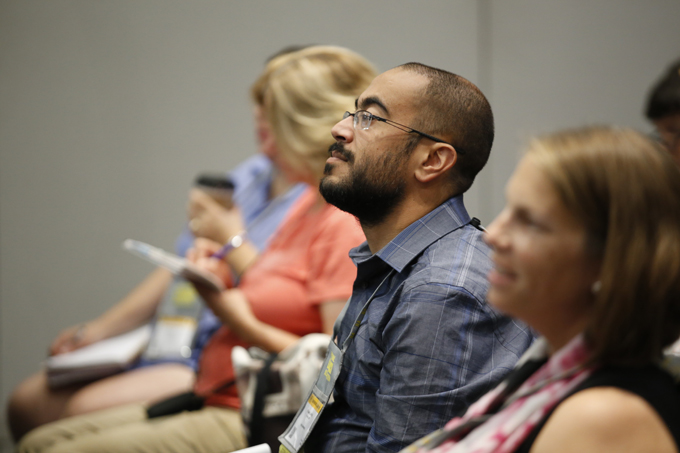
It’s often said that reading and writing are inextricably connected. They draw
upon shared knowledge bases and work in tandem to help students learn across
all content areas. Studies have proven that, when students practice reading, they
become stronger writers—and the opposite holds true as well: As students write
more frequently, their reading comprehension improves.
Yet despite a large body of research establishing this connection, writing is an
often overlooked tool for improving reading skills and content learning.
The research address at the International Literacy Association (ILA) 2019
Conference, “The Dos & Don’ts of Writing Instruction,” provides practitioners
with research-based information about how writing improves reading while
making the case for teachers, literacy specialists, and administrators to place
greater emphasis on writing instruction as an integral part of school curricula.
A new format
This year’s format will maintain the traditional research address but add a
roundtable discussion, creating a space for more participatory, engaged, and
self-steering conversation. With a more intimate setting and focused content,
the roundtable discussions will allow participants to connect with like-minded
professionals, ask questions, bounce off ideas, and receive feedback in real time.
The kickoff
The event will kick off with opening remarks by Douglas Fisher, professor of
educational leadership at San Diego State University and a past president of the
ILA Board; Diane Lapp, distinguished professor of education in the Department
of Teacher Education at San Diego State University; and David Kirkland, associate
professor of English education in the Department of Teaching and Learning
at New York University’s Steinhardt School of Culture, Education, and Human
Development. The session cochairs will provide a brief overview of today’s
literacy landscape, mapping some of the challenges that prevent effective writing instruction in the classroom as well as potential avenues for growth and
change.
Writing as a powerful driver for reading comprehension
Following is a keynote by Steve Graham, a leading expert on the educational psychology of writing. Graham, the Warner Professor in the Division of Leadership and Innovation at Arizona State University’s Mary Lou Fulton Teachers College, has dedicated more than 30 years to the study of writing. His research focuses on identifying the factors that contribute to writing development and difficulties, developing and validating effective instructional procedures for teaching writing, and the use of technology to enhance writing performance.
Graham is a past editor for leading journals such as Exceptional Children and Contemporary Educational Psychology and the author and editor of several books, including Powerful Writing Strategies for All Students (Brookes), Handbook of Writing Research (Guilford Press), and Best Practices in Writing Instruction (Guilford Press). In recent years, he has been involved in the development and testing of digital tools for supporting writing and reading through a series of grants from the Institute of Educational Sciences and the Office of Special Education Programs at the U.S. Department of Education.
Graham will share his insights into the connection between reading and writing and discuss a series of studies that have examined four factors—writing strategies, skills, knowledge, and will—that play an important role in writing performance and development. His keynote will make a compelling case for emphasizing writing in the classroom and across content areas.
Deep dive into topics of interest
Following the research address, attendees will have the opportunity to unpack, critique, and expand on the points put forth by Graham. Participants can choose to attend any of the 14 group discussions, facilitated by table leaders who are experts in specific aspects of writing.
Each table leader will explore one contemporary topic on writing instruction. The leaders will approach all topics through a lens of equity with the goal of improving outcomes for all students.
Following is the full list of table experts and topics:
- "Emergent Writing Instruction," Sharon O'Neal, professor, Texas State University
- “Elementary Writing Instruction,” Brian Kissel, professor of the practice of literacy, Vanderbilt University
- “Middle & Secondary Writing Instruction,” Kristen Campbell Wilcox, associate professor, SUNY Albany
- “Scaffolding for ELs,” Danling Fu, professor, University of
Florida
- “Preparing Writers for the Workplace,” T. DeVere Wolsey, professor, The American
University in Cairo
- “Self-Regulation,” Karen Harris, professor, Vanderbilt University
- “Spelling While Writing,” Malatesha Joshi, professor, Texas A&M University
- “Motivating Writers,” Zoi Philippakos, assistant professor, University of Tennessee
- “Writing Assessment,” Margarita Gomez Zisselsberger, assistant professor, Loyola
University
- “Technology: No Replacement for the Teacher,” Kay Wijekumar, professor, Texas A&M University
- “Digital Writing,” Troy Hicks, professor, Central Michigan University
- “Preparing Culturally Responsive Writing Teachers,” Marva Solomon, associate
professor, Angelo State University
- “Writing and Reading Connections Across the Disciplines,” Jennifer Serravallo,
teacher, author, and consultant, New York City
- “Inclusive Writing Instruction,” Sharlene Kiuhara, assistant professor, Utah University
Tangible takeaways
Kirkland, an ILA 2019 featured speaker who also serves as executive director of the Metropolitan Center for Research on Equity and the Transformation of Schools, will provide the closing keynote.
A leading national scholar and advocate for educational justice, his transdisciplinary scholarship explores intersections among race, gender, and education, focusing on the relationship between literacy and incarceration.
Kirkland’s presentation, “Gaining and Sharing Knowledge: Reading and Writing Joined Forever,” will outline key takeaways from the event as well as next steps educators can take to help students cultivate strong reading and writing skills in the 21st-century classroom. Participants will leave with easy-to-implement strategies and methods, grounded in culturally sustaining pedagogy, that promote academic achievement.
For more information about the Research Address, as well as a list of other featured research sessions at ILA 2019, visit ilaconference.org.
Alina O'Donnell is the communications strategist at ILA and the editor of Literacy Daily.
This article originally appeared in the open access July/August issue of Literacy Today, ILA’s member magazine.
The Research Address at ILA 2019 will be held on Saturday, Oct. 12, 3:00 PM–4:30 PM. For more information, visit ilaconference.org/iplanner.